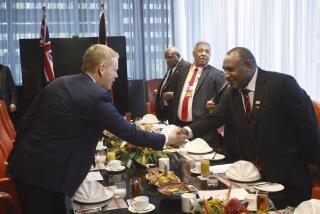Reagan Hopeful, but Aide Says New Zealand Is Not ‘a Good Ally’
- Share via
WASHINGTON — President Reagan, commenting publicly for the first time on New Zealand’s refusal to allow a U.S. warship to pay a port call, said Thursday that he deeply regrets the action and hopes the Wellington government will “restore the traditional cooperation that has existed between our two countries.”
“Allies must work together as partners to meet their shared responsibilities,” the President asserted.
A senior Administration official was much more blunt, declaring that “New Zealand could hardly be said now to be in the status of a good ally.” Therefore, New Zealand also cannot in the future expect to receive the preferential trade benefits of an ally, said the official, who spoke to reporters on condition that he not be identified.
“We’re not beating up on New Zealand,” the official said. “At the same time, we can’t stand up and say it makes no difference to us. . . . You can’t have it both ways.”
Reagan’s comments came in formal departure statements after a private meeting and luncheon with Australian Prime Minister Bob Hawke, who arrived in Washington earlier this week. Hawke reaffirmed his nation’s commitment to the 34-year-old ANZUS defense treaty among Australia, New Zealand and the United States.
The U.S. government Tuesday called off scheduled naval maneuvers with Australia and New Zealand to protest New Zealand’s refusal to permit the visit of a conventionally powered U.S. destroyer that could conceivably be carrying nuclear weapons.
New Zealand Prime Minister David Lange, who won election last year after pledging to reject visits by nuclear-powered or nuclear-armed ships, has demanded assurances that U.S. Navy ships are not carrying nuclear weapons when they visit his country’s ports. However, it is U.S. policy never to say whether any ship or aircraft actually has nuclear weapons aboard.
“We can’t start writing a textbook for the Russians about which ships do or do not carry nuclear weapons or when they are carrying nuclear weapons,” the senior Administration official said.
On Wednesday, however, the Administration moved carefully to avoid an embarrassing rupture in relations between the United States and Australia over another issue: Australia’s reneging on a promise to allow American planes to use Australian bases to monitor a test of the MX nuclear missile. Secretary of State George P. Shultz, after a meeting with Hawke, announced that the test will be conducted without Australia’s help.
Neither Reagan nor Hawke mentioned the MX incident in their meeting Thursday, the Administration official said. And Hawke maintained during a news conference that there is “no analogy” between the MX issue and New Zealand’s refusal to permit the docking of U.S. ships that are either nuclear powered or capable of carrying nuclear weapons. There are strong anti-nuclear movements in both countries.
No End to Treaty
Hawke also said that neither the United States nor Australia will “tear up” the ANZUS treaty but instead would hope for a reversal of New Zealand’s position.
In his statement, however, Reagan said “continued military cooperation is essential to maintenance of the alliance’s integrity and strength. We deeply regret the decision by the New Zealand government to deny port access to our ships. We consider New Zealand a friend. It’s our deepest hope that New Zealand will restore the traditional cooperation that has existed between our two countries.”
The senior Administration official said that New Zealand’s action “is bound to affect our view of virtually every matter that might come up under the treaty. . . . Clearly, the ANZUS relationship with New Zealand has a big problem with it.”
And while “we are not in the business of looking for sanctions or punishment” for New Zealand, he said, “there are benefits New Zealand has enjoyed in the past by virtue of being an ally, and it may not expect to enjoy those benefits in the future.” He cited, in particular, favorable tariff treatment for New Zealand’s lamb exports.
Hawke said Australia will continue to allow U.S. ships to pay port calls and that U.S. satellite tracking stations will remain operative in his country. But he said he will not try to pressure Lange to change his mind about visits to New Zealand by American ships, although he hopes Lange will do so.
More to Read
Sign up for Essential California
The most important California stories and recommendations in your inbox every morning.
You may occasionally receive promotional content from the Los Angeles Times.














